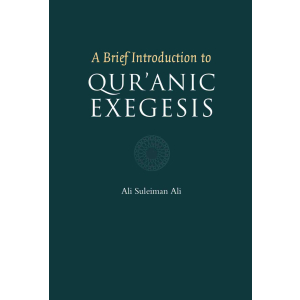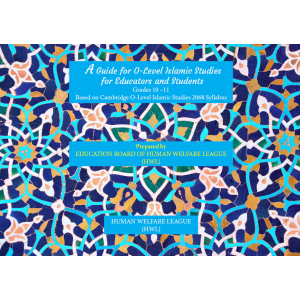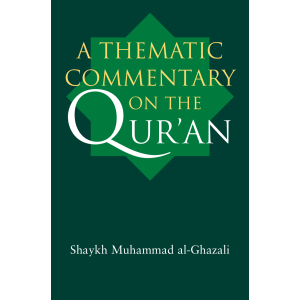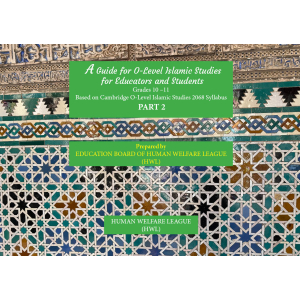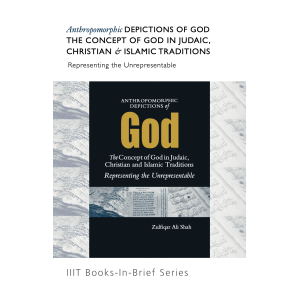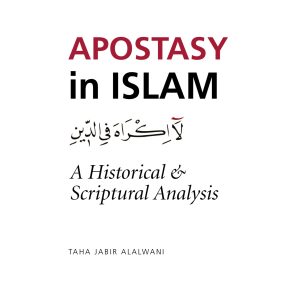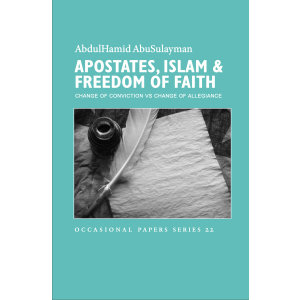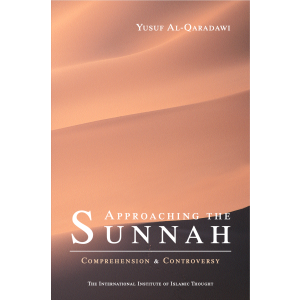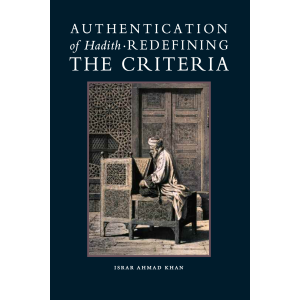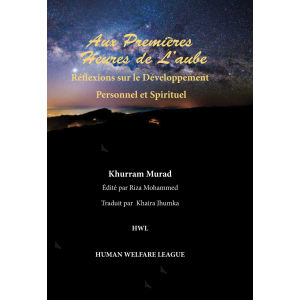-
A Brief Introduction To Quranic Exegesis
$0Overview
Generating precise comprehension of the Quran and the true meaning of its verses is arguably the essence of the most important of the Islamic sciences, Qur’anic exegesis or tafsir. Since the passing of the Prophet many scholars have worked hard to bring a proper understanding of the meaning of the Qur’an to Muslims, and indeed to the world at large, as fully as possible, in an attempt to widen knowledge of the guidance contained therein, and how to live life in accordance with its principles. The result has been a wealth of historical Muslim literature on the subject which has come to be known as Ulum alTafsir or the sciences of tafsir, a systematic exegesis of the Qur’an following several methodologies. This work traces the evolution of Qur’anic exegesis, from the time of the Prophet, the Companions, the Successors, the early mufassirun (exegetes) with independent tafsir works, to the present day. In doing so, it addresses some major issues including to what extent has tafsir been influenced by differing theological traditions (classical, mystical sufi, persian), political and sectarian interests etc. and how interpretation has differed in some cases, mainly pertaining to juridical, theological, historical, and linguistic issues.
-
A Guide for O-Level Islamic Studies for Educators and Students Grades 10 –11 Based on Cambridge O-Level Islamic Studies 2068 Syllabus PART 1
$8OVERVIEW A Guide for O-Level Islamic Studies for Educators and Students is a guide written to assist educators to teach the Islamic Studies subject to students of Grades 10-11 who are following the Cambridge O-Level Islamic Studies 2068 Syllabus.
-
A Thematic Commentary on the Qur’an
$0Overview
Muslims are enjoined, along with the rest of humanity, to “read” the two great Books of Revelation and Creation, i.e. the Qur’an and the natural world. Reading one without the other will result in an imbalance detrimental to the existence (and prosperity) of humankind on earth, indeed to the divine purpose in the cosmos. A Thematic Commentary by the late Shaykh alGhazali is a significant contribution to the first reading, i.e. that of the Qur’an the repository of divine truth and enlightenment. Already of course there is a wealth, an abundance, of exegetical work on the Qur’an. But while early scholars endeavored to elucidate many linguistic, historical, and miraculous aspects of the sacred and challenging text, alGhazali’s contribution is somewhat unique (and modern) in the sense that it focuses on the organic unity of each surah (chapter) highlighting the logic or inherent reasoning that courses through the surah and unifies its various components and images. No exegesis is by itself sufficient for a full understanding of the Qur’an. But this work is an indispensable companion in the quest for a better comprehension of, and a closer affinity with, the sacred text.
-
An Educators’ Guide to Teaching Islamic Studies Grades 10 –11 Based on Cambridge O-Level Islamic Studies 2068 Syllabus PART 1
$12A Guide for O-Level Islamic Studies for Educators and Students is a guide written to assist educators to teach the Islamic Studies subject to students of Grades 10-11 who are following the Cambridge O-Level Islamic Studies 2068 Syllabus.
This Guide presents the key topics to be covered in Paper 1 and Paper 2 under each of the following three sections, respectively:
Paper 1 History and Scriptures- Section A: Arabia in the Pre-Islamic Period
- Section B: Prophet Muhammad (pbuh)
- Section C: Texts from the Holy Qur’an and Hadith
Paper 2 Development, Sources, Beliefs and Observances
- Section A: The Caliphate Period/The Four Pious Caliphs
- Section B: The History and Importance of the Qur’an and Hadith
- Section C: Beliefs, Practices and Rituals
-
An Educators’ Guide to Teaching Islamic Studies Grades 10 –11 Based on Cambridge O-Level Islamic Studies 2068 Syllabus PART 2:
$12Part 2 of An Educators’ Guide to Teaching Islamic Studies covers Paper 2 Development, Sources, Beliefs and Observances which is examined under the Cambridge O-Level Islamic Studies 2068 Syllabus.
Similar to the approach adopted under Part 1 of An Educators’ Guide to Teaching Islamic Studies which covered Paper 1 History and Scriptures, Part 2 also presents the learning outcomes, content and references which have been developed for the following three sections and their key areas of study which are examinable under Paper 2 of the Cambridge O-Level Islamic Studies 2068 Syllabus
The learning outcomes developed under the Guide reflect the key aspects that students are expected to learn under Paper 2. Specific action verbs using Bloom’s Taxonomy have been utilised to develop these learning outcomes to provide an indication to educators and students on the level of understanding that students should have on a specific area of study to be able to successfully attempt examination questions.
Regarding the content of the syllabus, it is important to highlight that the content has been developed in bullet form to shed light on the main points to be taught by educators. Educators are expected to further expand on these key points in class to provide students with a comprehensive understanding and knowledge of the areas under study.
Finally, about the references provided in this Guide, please note that the Cambridge International Examinations (CIE) suggested resources, additional accessible resources and relevant mark schemes from 2011 to 2022 have been listed for educators and students to refer to. -
An Educators’ Guide to Teaching Islamic Studies Grades 10 –11 Based on Cambridge O-Level Islamic Studies 2068 Syllabus PART 2:
$8Overview
Book Type: Hard Copy
Part 2 of An Educators’ Guide to Teaching Islamic Studies covers Paper 2 Development, Sources, Beliefs and Observances which is examined under the Cambridge O-Level Islamic Studies 2068 Syllabus.
Similar to the approach adopted under Part 1 of An Educators’ Guide to Teaching Islamic Studies which covered Paper 1 History and Scriptures, Part 2 also presents the learning outcomes, content and references which have been developed for the following three sections and their key areas of study which are examinable under Paper 2 of the Cambridge O-Level Islamic Studies 2068 Syllabus
The learning outcomes developed under the Guide reflect the key aspects that students are expected to learn under Paper 2. Specific action verbs using Bloom’s Taxonomy have been utilised to develop these learning outcomes to provide an indication to educators and students on the level of understanding that students should have on a specific area of study to be able to successfully attempt examination questions.
Regarding the content of the syllabus, it is important to highlight that the content has been developed in bullet form to shed light on the main points to be taught by educators. Educators are expected to further expand on these key points in class to provide students with a comprehensive understanding and knowledge of the areas under study.
Finally, about the references provided in this Guide, please note that the Cambridge International Examinations (CIE) suggested resources, additional accessible resources and relevant mark schemes from 2011 to 2022 have been listed for educators and students to refer to. -
Anthropomorphic Depictions of God: The Concept of God in Judaic, Christian, and Islamic Traditions
$0Overview
This monumental study examines issues of anthropomorphism in the three Abrahamic Faiths, as viewed through the texts of the Hebrew Bible, the New Testament and the Qur’an. Throughout history Christianity and Judaism have tried to make sense of God. While juxtaposing the Islamic position against this, the author addresses the JudeoChristian worldview and how each has chosen to framework its encounter with God, to what extent this has been the result of actual scripture and to what extent the product of theological debate, or church decrees of later centuries and absorption of Hellenistic philosophy. Shah also examines Islam’s heavily antianthropomorphic stance and Islamic theological discourse on Tawhid as well as the NinetyNine Names of God and what these have meant in relation to Muslim understanding of God and His attributes. Describing how these became the touchstone of Muslim discourse with Judaism and Christianity he critiques theological statements and perspectives that came to dilute if not counter strict monotheism. As secularism debates whether God is dead, the issue of anthropomorphism has become of immense importance. The quest for God, especially in this day and age, is partly one of intellectual longing. To Shah, anthropomorphic concepts and corporeal depictions of the Divine are perhaps among the leading factors of modern atheism. As such he ultimately draws the conclusion that the postmodern longing for God will not be quenched by premodern anthropomorphic and corporeal concepts of the Divine which have simply brought God down to this cosmos, with a precise historical function and a specified location, reducing the intellectual and spiritual force of what God is and represents, causing the soul to detract from a sense of the sacred and thereby belief in Him.
-
Apostasy in Islam: A Historical and Scriptural Analysis
$0Overview
What is the legally prescribed penalty, if any, for apostasy (alriddah), and how does this relate to the demand for religious tolerance as stipulated in verse 2:256 of the Qur’an “There shall be no compulsion in matters of faith”? It is an established fact that the Prophet never, in his entire life, put an apostate to death. Yet, the issue remains one of the most controversial to have afflicted the Muslim world down the centuries. It is also the source of much damaging media coverage today as Islamic jurisprudence stands accused of a flagrant disregard for human rights and freedom of expression. The subject of this book is a highly sensitive and important one. The author rightly concentrates on evidence, to examine the historical origins of the debate in rigorous detail, as well as the many moral and contextual issues surrounding it. Disputing arguments put forward by proponents of the death penalty he contends that both the Qur’an and the Sunnah promote freedom of belief including the act of exiting the Faith and do not support capital punishment for the sin of alriddah. Note that attention is on the word sin, for there is qualification: as long as one’s apostasy has not been accompanied by anything else that would be deemed a criminal act, particularly in terms of national security, then according to the author, it remains a matter strictly between God and the individual. Of interest is the fact that the Qur’an significantly refers to individuals repeatedly returning to unbelief after having believed, but does not mention that they should be killed or punished. This work has been written at a time of great complexity and vulnerability when a true understanding of the higher intents and values of the Qur’an and the Sunnah, maqasid alshariah, is sorely needed. The author employs a strong evidence based approach examining in detail the Qur’an and authentic Hadith, taking into consideration traditional approaches to the study of the Islamic textual sciences and other fields of knowledge, as well as analyzing scholastic interpretation. Taking the life of a person without just cause is according to the Qur’an equivalent to the killing of the whole of mankind. It is vital therefore, that in the interests of compassion and justice, as well as freedom of belief, this subject is clearly addressed once and for all.
-
Apostates, Islam & Freedom of Faith
$0Overview
In this new and important analysis of apostasy (alRiddah), the author examines fundamental teachings of the Qur’an, the Sunnah of the Prophet, as well as historical as opposed to scriptural postulates, to uncover the origins of the debate and refute misconception. Mainstream media and critics of Islam delight in pointing to the death penalty as evidence of Islam’s draconian tenets, moral flaws and flagrant disregard for human rights. This demonstrates a complete misunderstanding of the correct Islamic position, what apostasy signifies in Islam, ignorance of Islamic principles of justice, as well as failure to comprehend the manipulation of religion for political purposes.
-
Approaching the Sunnah: Comprehension and Controversy
$0Overview
The Sunnah still provides the stable moral framework the grammar that enables Muslims, by formal rules and inward sense, to know right from wrong. However, separation from the mainstream of life puts the Sunnah in danger of becoming rigid an archaism. Addressing that danger, this book explains how the Sunnah can function as the grammar of a living, adaptive language, capable of guiding (and not shying from) the mainstream. The first chapter sets out the qualities that characterize authentic application of the Sunnah: universality, coherence (so that different spheres of human responsibility are not split), compassionate realism, moderation, and humility. The second explains standards and procedures for determining the Sunnah in the fields of jurisprudence and moral instruction. The third chapter illustrates through detailed examples common errors in understanding the Sunnah reading hadiths singly without sufficient context, confusing legal and moral injunctions, means and ends, figurative and literal meanings…and it proposes remedies for these errors.
-
Authentication of Hadith: Redefining the Criteria
$0Overview
In today’s complex and volatile world the consequences of relying on fraudulent and counterfeit Hadith to legitimize extremist behavior, issue violent fatwas, and justify blatant abuse, particularly of women, is not only far too easy but in fact dangerous. Israr Khan addresses the sensitive topic of Hadith authentication, focusing on the criteria adopted by classical scholars to maintain that concentration on the continuity and accuracy of the chain of narrators, rather than the textual content of Hadith, has led to particular Hadith being included which either contradict other Hadith directly, project the Prophet (SAAS) in an uncharacteristic light, or do not reflect and/or conflict with the teachings of the Qur’an. The study traces in careful detail the historical development of the oral and written traditions, as well as the many targeted attempts at fabrication that took place, critiquing in methodical detail certain Hadith which have come to be widely accepted as “authentic.” The prominent collections we have today, were made possible by the development of the science of Hadith criticism, and Muslim scholars deserve deep appreciation for their painstaking work, as well as their invaluable contribution towards preserving the Hadith literature to the best of their ability. However, insists the author, the process is ongoing, and the closed door policy which currently surrounds Hadith authentication needs to be carefully reexamined.
-
Aux premières heures de l’aube Réflexions sur le développement spirituel et personnel
$5Overview
‘Vivons pour Allah. Aimons ce qu’Il aime et apprécions ce qu’Il apprécie. Méprisons ce qu’Il méprise et détestons ce qu’Il déteste. Qu’il n’y ait pas de démarcation et de limites établies pour Le servir. Engageons-nous passionnément au sein de notre société pour réaliser Sa volonté et, tout aussi passionnément, faites que nos coeurs aspirent à Son plaisir. De même, laissons la vie du Prophète revivre dans nos vies à nous. Que son message, sa conduite, ses objectifs soient les nôtres. Aussi, que rien d’autre ne nous motive que le désir intense de plaire à notre Seigneur dans le prochain monde, et que cette espérance façonne résolument notre vie ici-bas. L’espoir d’un avenir, porteur de sens, doit nous amener à faire face aux risques et à surmonter les tribulations, que la vie ici-bas comporte, selon Sa volonté, tout au long de notre existence.
En tant que musulmans, nous n’avons qu’une seule option : nous efforcer de changer le monde selon le modèle donné à l’humanité par le prophète Muhammad ( SAW)’


